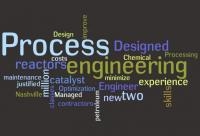|
|
Condensing Steam Heat Transfer Coefficient
#1

Posted 23 December 2011 - 07:12 AM
i have to design a cylendrical tank filled with an agitated batch to be heated by condensing steam flowing inside a coiled pipes welded horizontally on the walls . i have heat transfer coefficient for batch but i am not sure how to get the heat transfer coefficient for steam side and thereby cant calculate flow conditions of steam. thanks in advance for your help
#2

Posted 24 December 2011 - 01:27 AM
#3

Posted 24 December 2011 - 02:01 AM
Heat transfer coefficient of condensing steam for a coil in an agitated vessel can be considered as 1500 Btu/hr-ft2-˚F (8517 W/m2-K ). Refer example 20-1, chapter 20 of the famous heat transfer textbook, "Process Heat Transfer" by D.Q. Kern.
Regards,
Ankur.
#4

Posted 24 December 2011 - 08:20 AM
Referring to Kerns example, a steam side HTC of 2250 Btu/(ft2*h*oF), 50% more, would increase overall HTC from 136 to 140 Btu/(ft2*h*oF) (*). A steam side HTC of 750 Btu/(ft2*h*oF), 50% less (rather unusual), would result in overall HTC of 123 Btu/(ft2*h*oF). Thus steam side HTC (having a high value, i.e. small resistance) does not significally affect overall HTC.
2. Above assumes steam without "non condensables". Condensing steam HTC can go to half with 1% air (v/v), or to 1/3rd with 2% air (v/v), as Kern indicates (Fig 12.25 and p. 302).
3. C. R. Branan in "Pocket Guide to Chemical Engineering", Gulf- 1999, Chapter 7 - Heat transfer, suggests following ballpark values for partial HTC of condensing steam.
No air content: 1670 Btu/(ft2*h*oF)
10% air (v/v) 1000 Btu/(ft2*h*oF) note: Kern is more conservative
20% air (v/v) 250 Btu/(ft2*h*oF)
* Note : All other parameters same, overall HTC =1/ (1/588+1/2250+0.005)=140 Btu/(ft2*h*oF), data from Kern's example 20.1.
Editing note: "oC" corrected to "oF" in the units of HTC,after the post No 5 by ankur2061
Edited by kkala, 24 December 2011 - 03:09 PM.
#5

Posted 24 December 2011 - 12:41 PM
As far as I know English units don't use degree celsius, they use degree Fahrenheit. Is Btu / ft2-hr-˚C a recent introduction in English units? This is quite interesting.
Ankur
Edited by ankur2061, 24 December 2011 - 12:47 PM.
#6

Posted 25 December 2011 - 07:12 AM
however i have to clear a doubt that can we really take this value because
steam will eventually condense to water in the pipe (pipe could be as long as 900 mts) lowering steam side HTC. Also how does this value depends on flowrate of steam in pipe (as in Reynolds no in Nusselst's type relationship) as i want to minimise the heating time (by changing steam flow or pipe dia or steam temp) but keeping pressure drop and water hammer in the pipe into account.
thanks again
#7

Posted 25 December 2011 - 12:44 PM
-Agreeing to your thoughts (first para of framed text), problem could be alleviated by multiple steam inlets and condensate outlets, that is multiple short pipes instead of one long pipe. Care is needed for free condensate draining downwards. Previous thread http://www.cheresour...ing-large-tank/ can be useful (see also "tracing REVISION2.pdf" in it, though this may not be final)...... steam will eventually condense to water in the pipe (pipe could be as long as 900 mts) lowering steam side HTC.
Also how does this value depends on flowrate of steam in pipe (as in Reynolds no in Nusselst's type relationship) as i want to minimise the heating time (by changing steam flow or pipe dia or steam temp) but keeping pressure drop and water hammer in the pipe into account.
- It is not easy to find correlation of condensing steam HTC, probably because this does not control heat transfer. Perry (7th ed, 1997, p 11-21, Heating and cooling of tanks) refers to Stuhlbarg for sizing of tank coils (Pet Refiner, 38, 143, April 1959), we do not know whether a steam HTC formula is given. "Heat transfer for condensing vapors" is contained in the first pages of Chapter 13 of Unit Operations in Chemical Engineering by J Smith and P Harriot (McGraw-Hill, 1993). Formula for horizontal tubes does not depend on velocity (thus on Re number), assuming laminar condensate flow. Probably some member can find data for this HTC.
Similar Topics
Steam Pressure In Heat ExchangerStarted by Guest_mvanrijnbach_* , 15 Apr 2025 |
|

|
||
Heat Exchanger Steam FlowStarted by Guest_aliebrahem17_* , 25 Nov 2024 |
|

|
||
Steam Carrying Liquid From The Sour Water Stripping TowerStarted by Guest_kaidlut_* , 12 Sep 2024 |
|

|
||
Discussion - Predict Storage Tank Heat Transfer Precisely By Jimmy D KStarted by Guest_raj shekhar_* , 25 Mar 2025 |
|

|
||
Converting Superheated Steam To Saturated SteamStarted by Guest_addiesalsabil_* , 10 Sep 2023 |
|

|

 FB
FB










